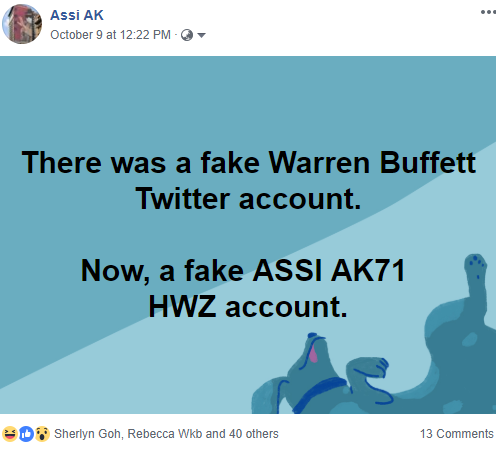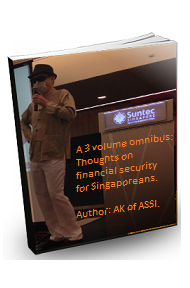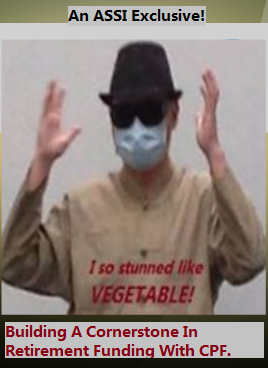During "Evening with AK and friends 2023" which took place in the evening of 10 May, I said that I liked a few real estate investment trusts listed in Singapore.
I mentioned a couple of videos I produced on some possible red flags to look out for when investing in real estate investment trusts.
As for real estate investment trusts which I liked, I mentioned AIMS APAC REIT as being one of them.
AIMS APAC REIT is one of my largest investments and this has been the case for many years since the Global Financial Crisis.
I told a long story about the real estate investment trust, and I hope the audience wasn't bored by it.
Anyway, I shared some of the reasons why I liked AIMS APAC REIT and still like it after so many years.
George Wang, the person who led the recapitalization exercise together with AMP back in the Global Financial Crisis has a meaningful stake in the real estate investment trust.
He is the chairman of the management team, and he said the following recently.
“For a structure to grow tall, its foundations must be strong and sturdy. It is only through the disciplined enhancement and selection of strong foundational assets that we are able to achieve financial resilience and sustainable growth. The quality of our portfolio has underpinned our robust performance throughout the COVID-19 pandemic and this period of rapid interest rate hikes, and I am very pleased to see our FY 2023 DPU increase by 5.1%, following FY2022 DPU increase of 5.7%."
Leaving aside the numbers which are commendable given the challenges, I really like what he said about foundations being strong and sturdy to grow.
Very down to earth.
I really like that he did not lead the rescue of the real estate investment trust so many years ago and then left everything to the management team.
It is evident to me that he is still active in giving directions.
During "Evening with AK and friends", I said that I liked AIMS APAC REIT because of the way they pursue growth.
The CEO said this recently.
"Looking ahead, our markets remain attractive and continue to offer abundant growth opportunities despite market headwinds. We are actively reviewing opportunities within our portfolio to drive organic growth, which includes adding value through active lease management to secure higher contracted rents, to underpin our future earnings."
The real estate investment trust still has properties with underutilized plot ratios.
The management has a track record of successfully redeveloping such assets to grow value and income for investors.
I am always wary of real estate investment trusts which keep buying properties, no matter the quality in order to grow and to collect fees, of course.
It is like growth at all costs.
Sometimes, growth can be too costly for us as investors because we are the ones who end up having to pay the price.
We have to be wary of managers who would even suggest buying properties which are only half occupied or properties with very short remaining leases of 15 years or so, for examples.
The only people who would surely make money from such situations are the managers.
Investors have to be more discerning on what kinds of deals to support.
Always ask if it makes sense or if we should be parking our money somewhere else?
Bear in mind the following.
Money should go to where it is treated best or even if this place is not the best place, it should be treated better here than in most other places.
Most people are incentivized by fees and there is nothing wrong with this if they made decisions which would benefit everyone.
However, many people are selfish, and we have seen ample examples in real estate investment trusts listed in Singapore.
I have many blogs about Sabana, VIVA and ESR, for examples, if you care to read more.
Anyway, back to AIMS APAC REIT.
They own a portfolio of 26 industrial properties in Singapore and three in Australia.
I like their relatively strong balance sheet with aggregate leverage at 36.1% and a blended debt funding cost of 3.4% and a weighted average debt maturity of 3.1 years.
About 40% of their portfolio is in the Logistics and Warehouse segment.
This segment has been experiencing double-digit rental growth across the four quarters, with leasing demand largely driven by third party logistics providers.
In FY2024, 21.4% of leases are due for renewal, of which 90.6% are from the Logistics and Warehouse segment and this presents strong positive rental reversion potential.
They also completed the conversion of a multi-tenanted lease to a master-lease arrangement for 23 Tai Seng Drive in FY2023.
Following an asset enhancement initiative or AEI which cost $1.6 million, the property is fully leased to Racks Central, a data center operator, for an average lease term of seven years.
It also lifted the valuation of the property by 32.0% from $29.4 million to $38.8 million on 31 March 2023.
I really like their strategy of organic growth to create value.
The manager is also evaluating several potential asset enhancement initiatives and redevelopment projects.
Upon completion, these properties are projected to deliver a stabilized net property income yield of between 7.0% to 8.0%.
AIMS APAC REIT has been and still is one of my largest investments.
I believe that the real estate investment trust will continue to bring home the bacon.
Leadership provided by George Wang who has skin in the game, a capable management team, a relatively strong balance sheet and a shareholder friendly strategy to grow value are just a few reasons to like AIMS APAC REIT.
Whether you should have AIMS APAC REIT in your portfolio depends on what you are looking for.
Remember that AK has been invested in AIMS APAC REIT for donkey years starting from the time when each unit was only 17 cents before 5 to 1 share consolidation took place a little later.
You want to ask if there are better investments than REITs now in an environment where money is significantly costlier.
Having said this, well run REITs which offer a reasonably attractive distribution yield will always have a place in any income investor's portfolio.
If AK can do it, so can you!
P.S. After "Evening with AK and friends 2023" ended, I had a few more thoughts to share. I published a blog in the wee hours of the morning. See:


















